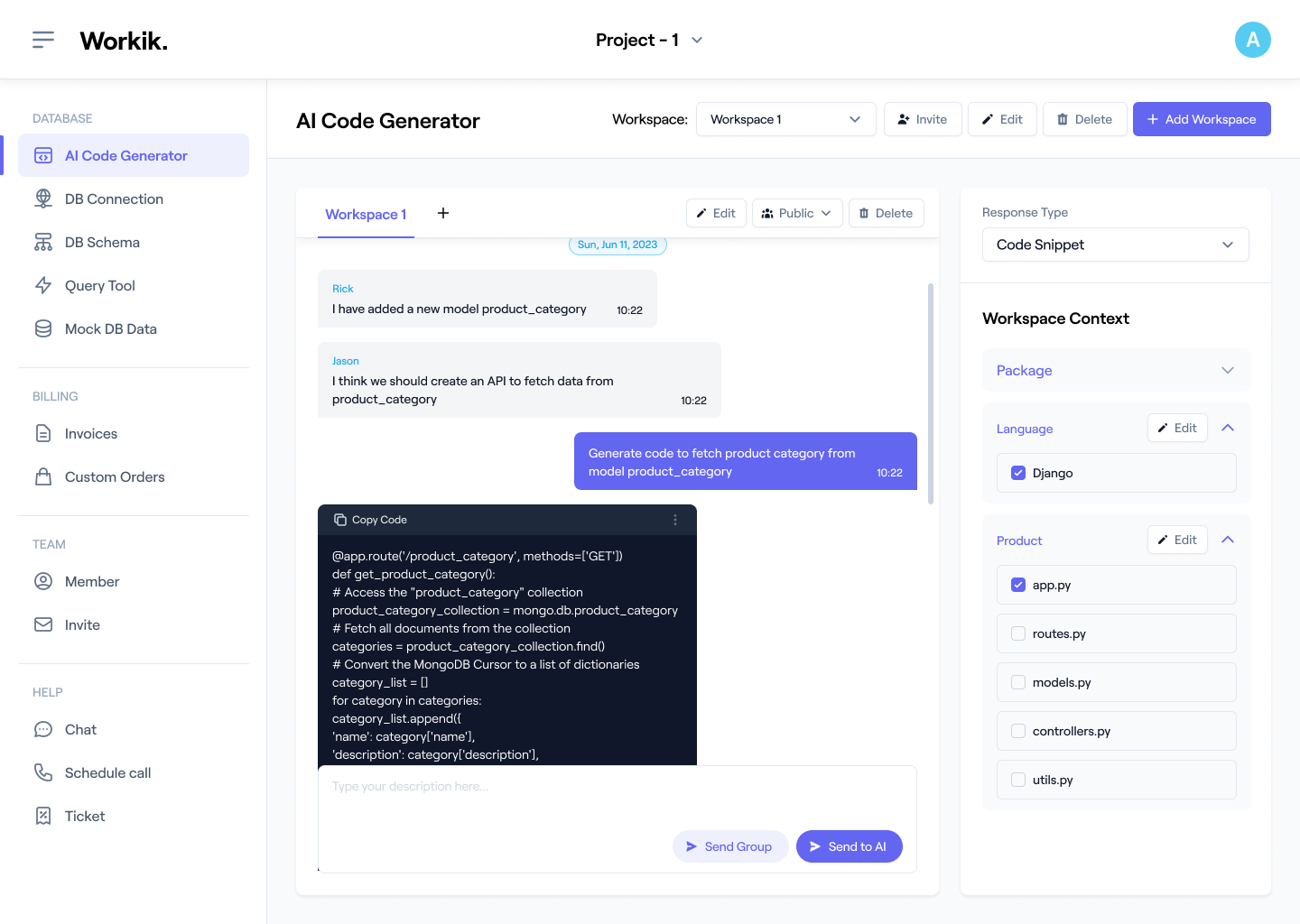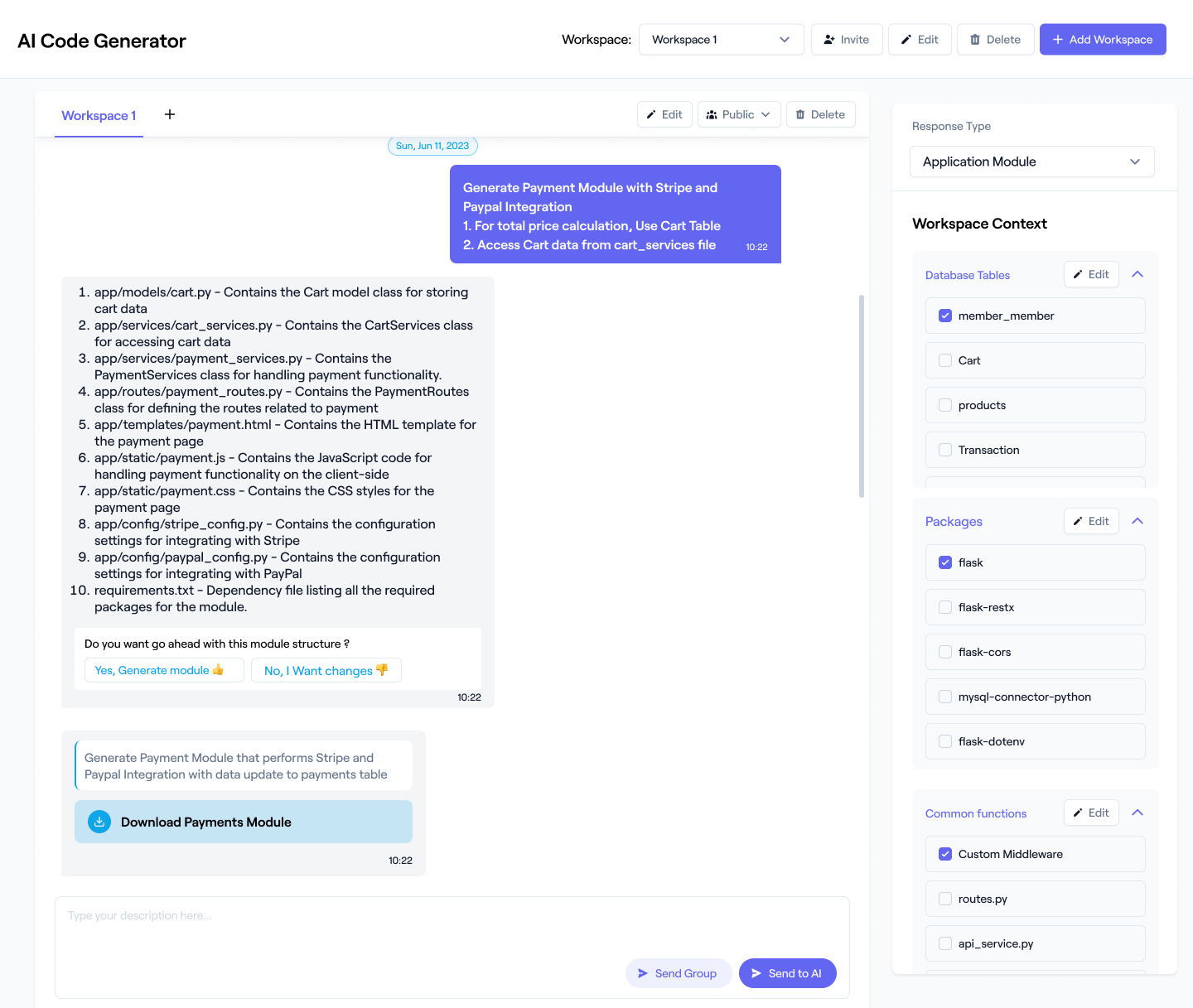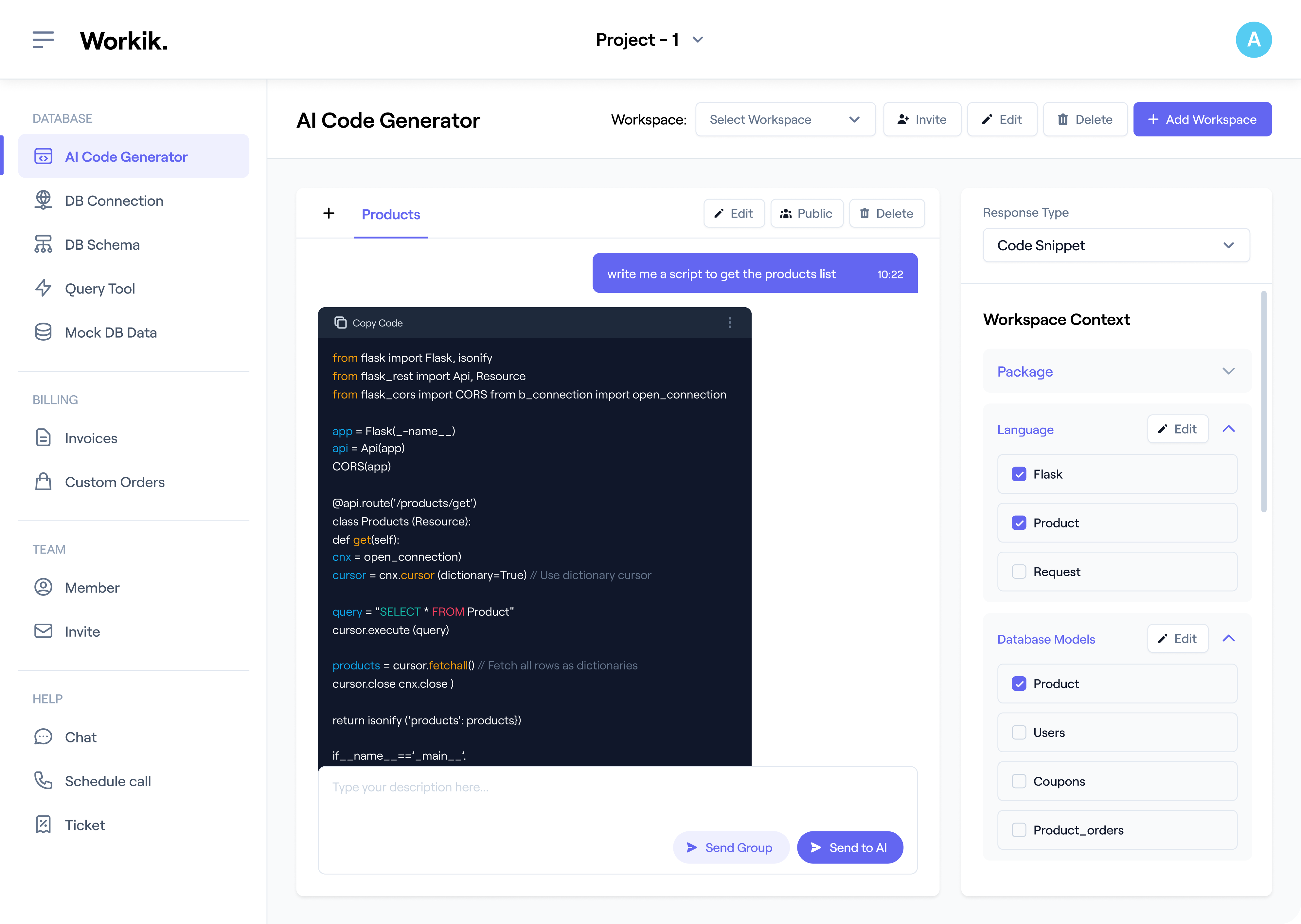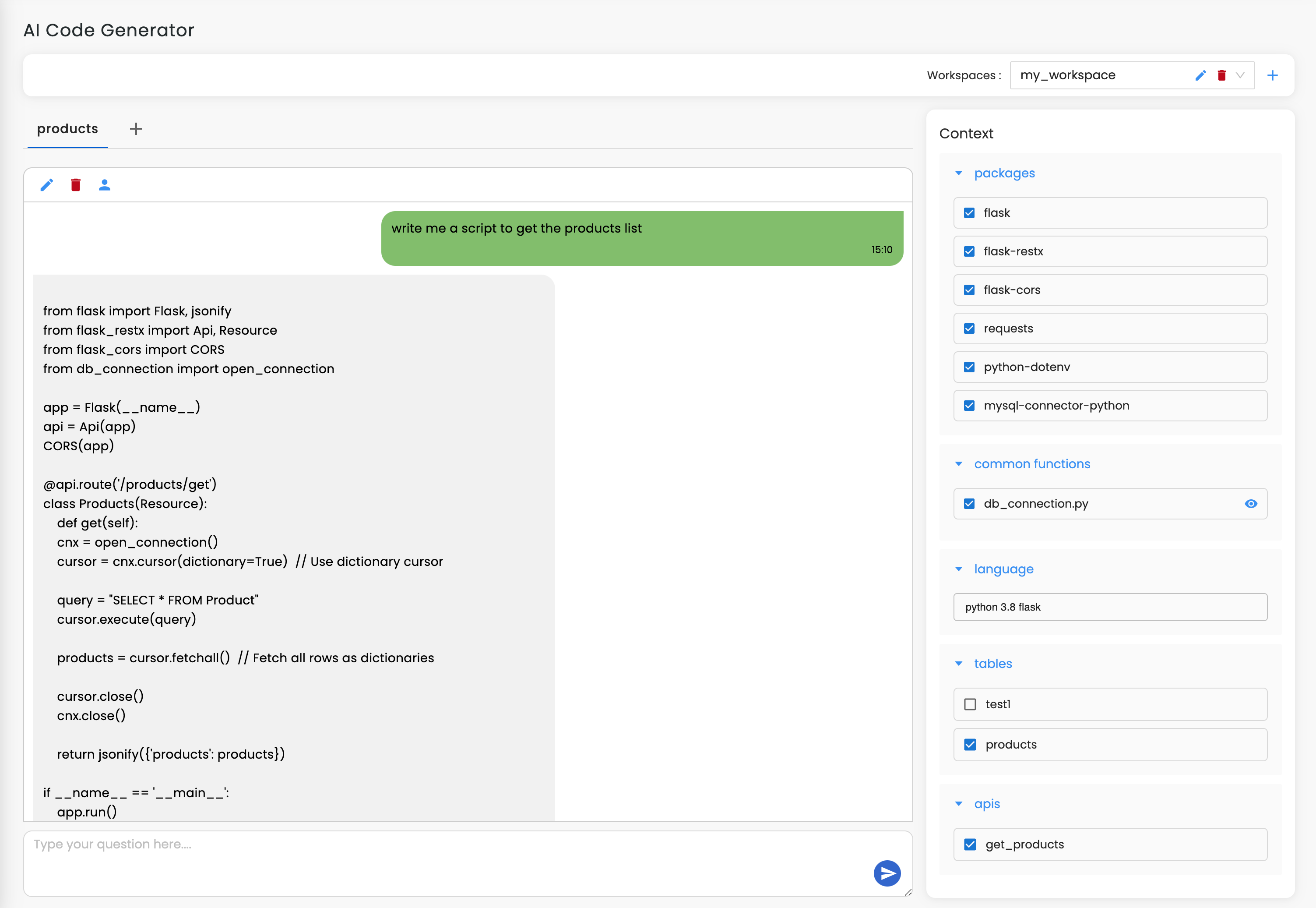
Join our community to see how developers are using Workik AI everyday.
Features

Convert Modern JavaScript
AI can configure @babel/preset-env to transpile ES6+ code for older browsers.

Build Tool Integration
Easily setup Babel with Webpack or Gulp to optimize plugins for seamless bundling without manual setup.

Compile JSX and TypeScript
AI can compile React JSX and TypeScript and help set up @babel/preset-react and @babel/preset-typescript.

Boost Performance with Plugins
AI enables tree-shaking and polyfills with @babel/plugin-transform-runtime, optimizing builds for faster performance and reduced bundle size.
How it works
Register quickly via Google or manually to access AI-powered Babel configuration tools.
Sync repositories from GitHub, GitLab, or Bitbucket. Specify project details like frameworks and environments. Workik AI analyzes your context and tailors the Babel setup accordingly.
Use AI to generate Babel configuration files, optimize presets, manage plugins, and more.
Collaborate with your team to review the configurations and implement them in your projects seamlessly.


Expand


Expand


Expand


Expand


Expand


Expand


Expand


TESTIMONIALS
Real Stories, Real Results with Workik
The AI-generated Babel configs saved me hours—so much easier to build great features!

Jessica Tran
Frontend Developer
Optimizing for different environments has never been simpler with the AI Babel tool. It’s a must-have!

Michael Patel
Full-Stack Developer
With AI-powered Babel configurations, our build process is smoother than ever and performance has boosted!

Sofia Gomez
DevOps Specialist
What are the popular use cases of Workik's AI for Babel configuration generation?


Some popular use cases of Workik's AI-powered Babel configuration generation include but are not limited to:
* Generate optimized Babel configurations for modern JavaScript, ensuring older browser compatibility.
* Set up presets for React, TypeScript, or Vue.js to streamline development.
* Manage plugins for code splitting, tree-shaking, and performance.
* Create environment-specific configurations for development and production.
* Integrate with build tools like Webpack or Gulp for seamless bundling.
What kind of context can I add in Workik AI related to Babel configuration generation?


Setting context in Workik is optional but enhances AI-generated Babel configurations. Here are the types of context you can add for Babel configuration generation:
* Programming language (e.g., JavaScript, TypeScript)
* Codebase files (import projects from GitHub, GitLab, or Bitbucket)
* APIs (e.g., integration requirements for RESTful APIs or GraphQL)
* Frameworks (e.g., React, Vue.js, Angular)
* Build tools (e.g., Webpack, Gulp, Rollup)
* Project requirements (e.g., support for legacy browsers, optimization needs)
How does Workik AI optimize Babel configurations for different environments?


Workik AI generates tailored Babel configurations for development, production, and testing environments. It optimizes for performance by enabling tree-shaking and minification in production, while adding debugging tools for development, ensuring seamless compatibility across all stages.
How does Workik AI handle Babel plugins and presets?


Workik AI configures essential presets like @babel/preset-env for browser compatibility, @babel/preset-react for JSX, and @babel/preset-typescript for TypeScript. It also manages crucial plugins such as @babel/plugin-transform-runtime to optimize code and reduce duplication.
How can Workik AI help ensure Babel compatibility with testing frameworks?


Workik AI configures Babel to work seamlessly with testing frameworks like Jest, Mocha, and Cypress, ensuring proper transpilation of modern JavaScript syntax like JSX and ES6 for smooth test execution.
Can Workik AI improve security in Babel configurations?


Yes, Workik AI enhances security by integrating plugins like transform-remove-console to strip debug logs and unnecessary code, ensuring secure transpiling for production builds in security-sensitive projects.
How does Workik AI help maintain up-to-date Babel configurations?


Workik AI continuously updates your Babel configuration to include the latest ECMAScript features, automatically adding support for new JavaScript syntax and deprecating outdated plugins, ensuring your project stays current.
How does Workik AI integrate Babel with serverless architectures or edge computing setups?


Workik AI configures Babel for serverless platforms like AWS Lambda or Cloudflare Workers by targeting specific runtimes (e.g., Node.js 14) and enabling lightweight builds with tree-shaking and runtime optimization. For edge setups, it minimizes polyfills and optimizes async handling for fast execution on distributed nodes.
Generate Code For Free

Babel: Question and Answer
Babel is a JavaScript transpiler that converts modern JavaScript (ES6+) into older versions of JavaScript that can run on different environments or older browsers. It allows developers to use the latest JavaScript syntax and features without worrying about browser compatibility, making it essential for projects using React, TypeScript, and other modern JavaScript frameworks.
Popular languages and tools integrated with Babel include:
Languages:
JavaScript (ES6+), TypeScript, JSX (for React)
Frameworks:
React, Vue.js, Angular, Node.js
Build Tools:
Webpack, Rollup, Parcel
Plugins:
@babel/plugin-transform-runtime, @babel/plugin-syntax-dynamic-import, @babel/plugin-proposal-class-properties
Presets:
@babel/preset-env, @babel/preset-react, @babel/preset-typescript
Popular use cases of Babel in web development include:
Transpiling modern JavaScript:
Convert ES6+ to ES5 for compatibility with older browsers like IE11.
React development:
Transpile JSX into regular JavaScript.
TypeScript support:
Transpile TypeScript into JavaScript for seamless integration.
Polyfilling features:
Enable new JavaScript features like promises, async/await, and arrow functions on older platforms.
Optimizing bundles:
Support tree-shaking and modular imports for smaller bundle sizes.
Testing compatibility:
Ensure modern syntax works with Jest, Mocha, and Cypress.
Career opportunities for developers skilled in Babel include Front-end Developer, Full-stack Developer, JavaScript Engineer, React Developer, Build Engineer, DevOps Engineer (for build pipelines), and Node.js Developer. Expertise in Babel is essential for teams working with modern JavaScript frameworks and ensuring cross-browser compatibility.
Workik AI provides comprehensive assistance with Babel configuration, including:
Configuration Generation:
Creates .babelrc and babel.config.js based on your project, including necessary presets and plugins for frameworks.
Debugging and Troubleshooting:
Detects and fixes misconfigurations, plugin conflicts, and incorrect presets.
Optimization:
Suggests performance improvements, such as bundle size reduction, tree-shaking, and optimized browser compatibility.
Plugin and Preset Management:
Configures essential plugins like @babel/plugin-transform-runtime and presets such as @babel/preset-typescript for seamless integration.
Automation:
Automates repetitive tasks, like adding new presets or managing settings for tools like Webpack or Parcel.
Continuous Updates:
Keeps your Babel configuration up-to-date with the latest ECMAScript features and deprecates outdated plugins.
Explore more on Workik
Get in touch
Don't miss any updates of our product.
© Workik Inc. 2026 All rights reserved.

